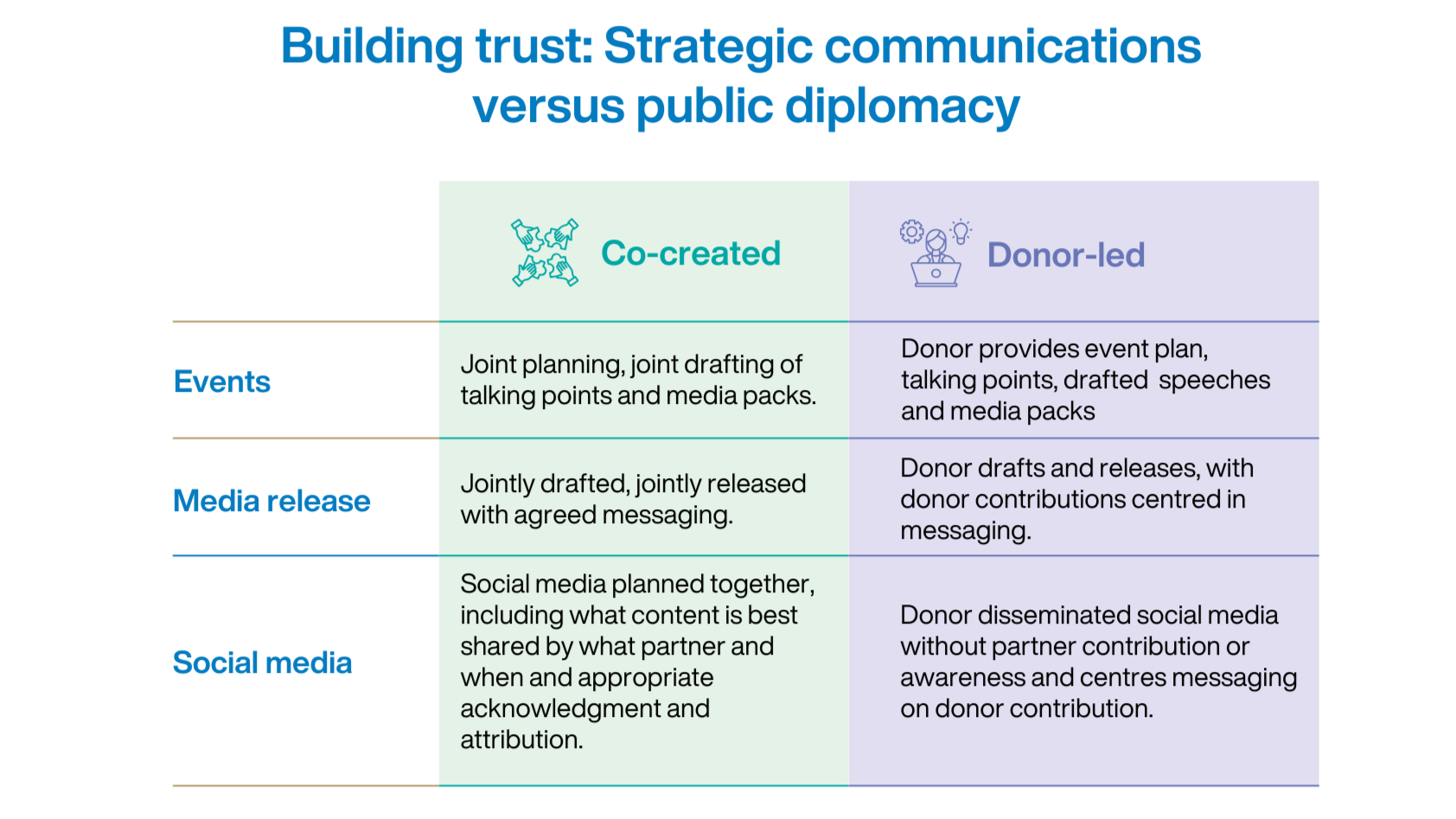Building and signalling trust: The combined power of strategic communications and public diplomacy
By Lisa Ritchie, Communications Strategist and Founder of EngagingDev
Good development stems from strong, enduring partnerships at a range of levels, including between governments, between programs and governments, between governments and communities, between programs and communities, and between individuals across all stakeholders.
Strong partnerships are built on trust. In development, trust is everything. It shapes partnerships, influences reform, guides public sentiment and determines whether a program is seen as credible, capable and aligned with national priorities.
Trust is built. It is earnt. It accumulates and it can disintegrate.
When done well, a program’s strategic communications and public diplomacy contribute to building and earning trust. When not done well, both can contribute to its demise.
Strategic communications and public diplomacy each play a different role in shaping credibility and perception, but the programs that benefit the most are those that understand how the two work together. A program or donor can build trust through clear, consistent and respectful communications over time. In an era of heightened scrutiny, geopolitical competition and fast-moving narratives, trust has become one of the most valuable assets a program can hold.
Strategic communications: Building trust through behaviour and clarity
Strategic communications sits inside program delivery. It is designed to build understanding, alignment and support program progress through targeted messaging and engagement and regular and reliable sharing of information.
This is where trust can be built.
Strategic communications earns trust through:
Transparency: Programs that share progress honestly and clearly, including setbacks, build credibility.
Consistent engagement: Regular updates, intentional stakeholder communication and clear narratives create predictability. Predictability builds confidence, and confidence builds trust.
Partner respect: When programs communicate in ways that centre partner leadership, local priorities and national context, they demonstrate respect. Respect underpins trust.
Internal alignment: When a program’s messaging is consistent across teams, technical areas and leadership, stakeholders experience clarity rather than confusion. Consistency signals competence, and competence builds trust.
Overall, strategic communications builds relational trust that strengthens partnerships, facilitates an environment for change and supports sensitive policy dialogue.
Public diplomacy: Building trust through visibility and narrative
Public diplomacy operates in a different space. It looks outward to tell the broader story of partnership, values and shared purpose. When done well, public diplomacy strengthens perceptions of reliability, equality and respect between nations.
Public diplomacy earns trust by:
Demonstrating partnership: Balanced co-branding, joint announcements and shared public engagements show equality rather than hierarchy. Trust grows when audiences see genuine partnership and not donor dominance.
Reinforcing credibility: High-quality, timely and partner-led public storytelling shows that a donor is accountable, values-driven and aligned with local priorities.
Providing assurance: For both domestic and in-country audiences, consistent, genuine public diplomacy signals stability.
Public diplomacy builds the perceptual trust that shapes public opinion, supports diplomatic influence and strengthens donor credibility.
Trust is strongest when both disciplines work together
Strategic communications builds trust internally and relationally. Public diplomacy builds trust externally and perceptually.
When strategic communications and public diplomacy work in alignment, they build a strong foundation of trust that grows over time. This foundation helps programs navigate challenges, progress change and strengthen the credibility of both donors and partners.
The takeaway
Trust is a prerequisite for good development, not an outcome. Strategic communications builds trust through clarity, transparency and respect while public diplomacy reinforces it through visibility, balance and shared narratives.
When both disciplines are intentional and aligned, programs build, earn and deepen trust, strengthening relationships, enhancing influence and supporting better development outcomes.


